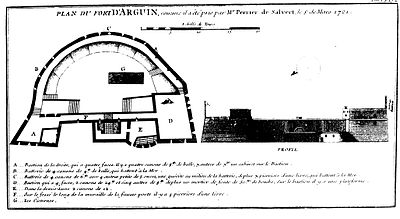| Revision as of 19:02, 27 April 2008 editVina-iwbot~enwiki (talk | contribs)19,059 editsm robot Adding: zh:阿爾金← Previous edit |
Revision as of 00:29, 15 June 2008 edit undoLightbot (talk | contribs)791,863 edits Units/dates/otherNext edit → |
| Line 1: |
Line 1: |
|
] |
|
] |
|
] |
|
] |
|
'''Arguin''' (]: ''Arguim'') is an ] off the western coast of ] in the ], at 20° 36' N., 16° 27' W. It is six ] long by two broad. Off the island are extensive and dangerous ]s. It is now part of The ]. |
|
'''Arguin''' (]: ''Arguim'') is an ] off the western coast of ] in the ], at 20° 36' N., 16° 27' W. It is six km long by two broad. Off the island are extensive and dangerous ]s. It is now part of The ]. |
|
|
|
|
|
== History == |
|
== History == |
|
|
|
|
|
Arguin has long been coveted by seafaring nations for its strategic location, and control over the island has changed hands numerous times. The first ]an to visit the island was the ] explorer ] in ]. In ], Prince ] set up a trading post on the island, which acquired ] and ] for Portugal. By ], 800 slaves were shipped from Arguin to ] every year. |
|
Arguin has long been coveted by seafaring nations for its strategic location, and control over the island has changed hands numerous times. The first ]an to visit the island was the ] explorer ] in 1443. In 1445, Prince ] set up a trading post on the island, which acquired ] and ] for Portugal. By 1455, 800 slaves were shipped from Arguin to ] every year. |
|
|
|
|
|
In ], during its ] (which then controlled Portugal), the ] seized control of Arguin. It remained under Dutch rule until ], although Dutch governance was interrupted by ] rule in ]. ] briefly controlled the island in September 1678, but the island was then abandoned until ]. |
|
In 1633, during its ] (which then controlled Portugal), the ] seized control of Arguin. It remained under Dutch rule until 1678, although Dutch governance was interrupted by ] rule in 1665. ] briefly controlled the island in September 1678, but the island was then abandoned until 1685. |
|
|
|
|
|
Arguin was an early ] of the ] ] of ], and its succeeding ] from 1685 – ]. France then took control of the island, only to lose it the following year to the ], before regaining it in ]. This next period of French rule lasted four years; in ] it reverted to Mauritanian tribal chiefs. The island became a French possession once more during the early ], as part of French-colonized ]; it remained under Mauritanian rule when that country became independent in ]. |
|
Arguin was an early ] of the ] ] of ], and its succeeding ] from 1685 – 1721. France then took control of the island, only to lose it the following year to the ], before regaining it in 1724. This next period of French rule lasted four years; in 1728 it reverted to Mauritanian tribal chiefs. The island became a French possession once more during the early 20th century, as part of French-colonized ]; it remained under Mauritanian rule when that country became independent in 1960. |
|
|
|
|
|
== Sources == |
|
== Sources == |
Arguin has long been coveted by seafaring nations for its strategic location, and control over the island has changed hands numerous times. The first European to visit the island was the Portuguese explorer Nuno Tristão in 1443. In 1445, Prince Henry the Navigator set up a trading post on the island, which acquired gum arabic and slaves for Portugal. By 1455, 800 slaves were shipped from Arguin to Portugal every year.


